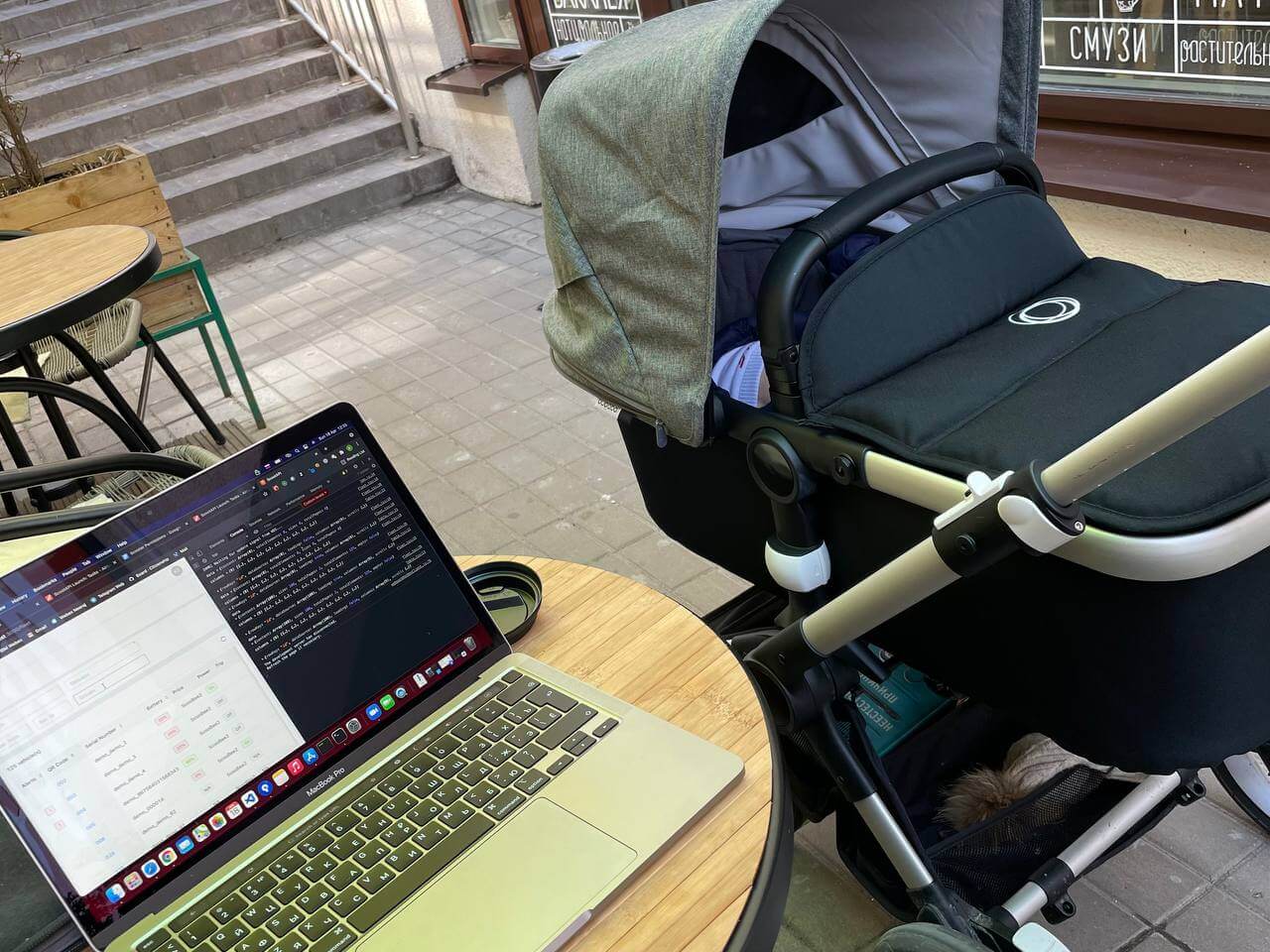Blondie in Tech: "Stories About Imperfection Empower Others"
Frontend developer Katerina Zakrzheuskaya, known on Instagram as "Blondie in tech," combines her developer job, maternity leaves then children, a husband, and a life, inspiring girls by her example. She not only codes, she also knits, creates content attracting millions of views, and shares insights on entering the tech field. Katerina shares her success story exclusively with Anywhere Club.

Microchip games, learning SQL in three days, maternity leave
I was born in an engineer's family, so it was clear from the start what I would become. In my childhood, I spent hours assembling puzzles. Instead of toys, I had my dad's microchips and a screwdriver — quite an engaging pastime.
I excelled in school, participating in Olympiads for each subject over the years, but mathematics was always my special love. Even now, I sometimes download samples of exams for university admission and solve them in my spare time — just for fun.
Back when I graduated from school, there was a pretty outdated perception of programmers. They were thought of as bearded guys, sitting in small rooms with dim light, who were not particularly fond of socializing. This didn't align with my dream job at all! On the other hand, studying economics was highly regarded, and it was decided at a family meeting that I should pursue a path in an economic university — according to the plan, that's where I would "become human." I ended up studying finance and banking, and I thought that working at a bank was the limit of my dreams.
After completing my studies, I found my first job at a bank — they were looking for a risk analyst with knowledge of the SQL programming language. Before the interview, they asked me if I knew SQL. Honestly, I had only vaguely heard of it somewhere in the lectures I attended at university, but I had no idea how to work with it. Here was my first challenge — I managed to learn the language in 3 days and successfully passed the technical interview, where I had to write code in SQL.
During my work, I found programming to be interesting… and there were hardly any bearded guys there. For a year, I worked and actively improved my skills. At that time, there was no Stack Overflow, and most bugs had to be fixed manually and with perseverance.
After a year, feeling greatly disappointed in the banking structure overall and the salary level in particular, I moved to an even "more serious and popular" company. But there, I didn't need to write code at all, only extract the results of scripts into Excel. I realized that I no longer wanted to work without coding.
Then came my first maternity leave, and I had plenty of time to figure out where I wanted to go next. At that time, tech courses were just beginning to emerge, and I immediately enrolled in them.
It's worth mentioning that my environment did not support me at all. Even my parents said that I was wasting time and money in vain, and that I should go back to the bank.
But my front-end studies began with my maternity leave courses, and I immediately understood that I could make it! I was one of the best students in the group, and became the leader of the final project, assigning tasks to adult men. Our teacher told us that out of the whole group, only 3 or 4 people would find a job, and he was right. Many students didn't even make it to the end of the course, dropping out along the way.
Second maternity leave, React, work-life balance

I quickly found my first developer job — after 2 months of applying, I saw a vacancy for an SQL developer at IBM Group. I thought that since I already had experience with SQL, my chances of success were high, but I was rejected. I was so confident in my abilities, however, that I wrote to their HR department, telling them they were wrong and that I was the right fit. A couple days later, they contacted me and offered me an interview as a frontend developer. I worked at IBM for wonderful 3 years, developing a chatbot application for them, which they used on their official websites! Then, the world was hit by the coronavirus and other events that coincided with my second maternity leave, and the team was relocated.
Being on maternity leave was too boring, so I decided that I needed a new challenge and a new job. That's how I ended up at the startup ScootAPI part-time. This format of work was ideal for maternity leave.
I still work as a frontend developer, using React and TypeScript.
My day now is hard to call structured. During the day, I juggle work, two kids, and taking care of myself. Besides my developer job, I also dabble in driving, cooking, teaching, and so on. Of course, something occasionally falls short (usually self-care), but I try to maintain balance. At the very least, I don't work on weekends, which sometimes seems like a very tempting idea. And despite all the advantages of remote work (working from anywhere, anytime), you sometimes literally have to work at any time. Once, I spent an hour sitting in the car outside a SPA complex on my scheduled day off because everything was crashing, and I urgently needed to fix it.

Such moments can easily lead to burnout when your time seems like it doesn’t belong to you. It's important to set boundaries and to try working only during work hours, while being a bit more selfish and thinking about your mental health the rest of the time.
In my blog, it might seem like I'm perfectly managing everything and getting everything done. But, like any person, sometimes I don't manage something. I believe that it's important to talk about that, because stories of imperfection help other people and give them strength. I often receive messages from girls thanking me for honestly sharing my daily life and motivating them.
Of course, I get tired too, but my secret lies in energy conservation: you need to do more activities during the day that give you energy than that drain your energy. I always try to add little things to energy-consuming routine tasks that can recharge me. I'm lucky that I genuinely love my job, and I also love cooking, so recharging for me is usually not very difficult.
An interesting observation: the less I work (or if I don't work and spend the whole day with the kids), the more tired I get. Because my job is in the "give energy" column, it's actually easier for me to deal with household chores. Of course, everything is good in moderation. If my battery is running low, I postpone work, meet friends, switch off my mind during a massage, and immediately feel better. This is a life hack from a psychologist: to get mental rest, you need to switch your brain to physical stimulation (a massage works really well).
As I mentioned earlier, during my second maternity leave, I decided to continue working part-time. There were reasons for this besides boredom. Technologies are developing so fast now that a three-year maternity leave would have undone all my previous knowledge and achievements. This was part of the reason that I didn't stop working. It was absolutely the right decision for me. And now, after the end of my maternity leave, returning to the fray is not scary at all. I feel much more confident in my experience and abilities.
Blondie in tech blog: truth, hate, mentorship
The idea of starting a blog found me on its own. I had been running a private page for friends for a long time. Every time I met someone who knew of the page, they would tell me how well it was going and that I should definitely continue to develop it further. I struggled with whether to do that for a long time but, in the end, I listened to the feedback. Within six months, the blog grew from 700 followers to almost 9 thousand, and I'm not stopping there. The blog turned out to be a wonderful form of therapy and a way to work through my blocks. It also gave me a clearer understanding of who I am and what I want to convey.
But in the context of the blog, I can't help but talk about hate. I first encountered hate on TikTok. I made a simple video with a programmer life hack that even a person far from the tech arena could replicate. And then all hell broke loose! Thousands of male programmers felt it was their duty to put me down and prove that I'm not a real programmer. Screenshots of those comments eventually turned into a video on Instagram, which garnered 1.2 million views. It felt to me like every Russian-speaking tech specialist on the planet saw it. That's how all the developers in my team at work found out about my blog, and joking about work became a bit more difficult.
The hate still continues at times, and I carefully keep all the fieriest comments. But they don't trigger me because I know my worth.
Now that more people are reading my blog, hate has started coming in on other topics as well. Recently, I received a long message about how I'm not showing the right things, how disappointed someone was, and how I'm not good enough. It upset me, but I politely replied that it's my blog and my rules. And, miracle of miracles, later that same day the girl wrote to me again. She apologized and said that it had been a difficult day for her, and that she had vented her accumulated negativity on me. This situation made me realize that all the hate is not about me. Instead, it primarily shows what's inside other people.
Is it difficult to be a woman in tech?
The topic of women programmers is the most triggering one for me in my blog and, of course, there's a lot of hate there. But I must say that I rarely encounter it in reality. Yes, it might be easier for guys to establish relationships within the team: they go for a beer together and suddenly they're friends. But women in IT benefit from their overall sociability and openness.
I see many women startup founders and read many stories about girls who have succeeded in the profession and even opened their own tech schools, and that's wonderful! I generally believe that a woman with children is a much more effective worker because she is always motivated to meet deadlines. She will always be interested in doing the work as efficiently as possible because she also needs to pay attention to her children — there's simply no time to be inefficient or lazy.

Knitting: at meetings, in the pool, and while watching TV
I've always been active and passionate, and I've always loved working with my hands. In the courtyard of my house, there was a community center with various clubs — that's where I started crocheting, knitting, making doilies on wooden forms, embroidering, and weaving straw! In childhood, I even designed and knitted myself a swimsuit. Back then, everyone in class laughed. But now, knitted swimsuits are a trend. Turns out, I foresaw the fashion future!
Nowadays, I can knit anywhere, I take my needles to cafes and even to the pool if I really want to finish an item quickly. I also knit during meetings, of course.
I especially love knitting sweaters. I realized that I enjoy the monotonous process. I can relax and knit 20-30 rows while watching a TV show, clearing my mind, and not having to check patterns. This season, I knitted a very cool sweater! I wear it occasionally, and I'm very pleased with it.

I also have a large suitcase filled with tools and a set of screwdrivers for any occasion. I occasionally fix things around the house. I gifted myself a power drill for my birthday. I haven’t had occasion to use it yet; it is in the closet, faithfully awaiting its turn.
I also once made a math app for kids. The idea came to me when I saw my daughter struggling with her studies. Modern children perceive information very differently, and traditional teaching methods didn't work well for her. I decided to take the path of least resistance and made a tablet game. She practiced her multiplication tables all summer and passed the "exam" at the end of August — 50 questions without a mistake. I consider this a big victory for me. I still want to go back and make this app available for free download on the App Store, but there always seem to be more pressing matters.
How to enter the tech field in 2024
The situation in the tech market in 2024 is radically different from what it was five years ago. The industry changed significantly after COVID and other events. It's particularly tough for junior specialists. In the past, many companies would "grow" juniors — hire them without experience and train them in everything. But now, everyone wants to hire at least mid-level professionals, people who can take on tasks and get them done without needing much more time investment by the employer.
That seems to be the biggest challenge. My advice, and the advice of others, is — if you're looking for your first job experience, accept any internship to fill that first line on your resume. It'll get easier from there!
My main recommendations at the start of your career — don't choose a programming language/industry based solely on popularity or salary. With that approach, there's a high chance of missing the mark and struggling with the learning process. There are many free tests that can help you determine your aptitude for specific languages/industries — they're very helpful in making career decisions. I've tried them several times myself and, according to the tests, I'm in the right place.
Also, be sure to get feedback! Don't take self-study courses without feedback. Don't try to learn independently if you're not particularly organized. The goal is not just to solve a task by any means, but to do it effectively and without crutches, which you might not even realize you are using unless you have a mentor. Even if you choose the course route, make sure to research the instructor. Check their LinkedIn and work experience. Everyone is being invited to teach courses now, and sometimes it gets absurd — my friend finished a course, and the next day a recruiter from that company wrote to her offering a teaching position.
One final note about mentoring: I still don't take people under my wing and mentor them. I don't yet feel the internal strength to do it for money. Impostor syndrome is still getting in the way a little bit here. For those wondering, "What is impostor syndrome?" it refers to the internal experience of believing that you are not as competent as others perceive you to be.
But I always answer questions and help for free. With my help, a friend completed a frontend development course, then switched to testing, and has already grown into a mid-level position. Oh, how many voice messages I left explaining things to her! But it's all worth it if I can help someone find a job they love.
So, feel free to reach out to me.

.png)
